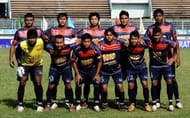Among the key decisions at AIFF’s emergency committee meeting in New Delhi last Monday, the one that could seriously affect the development of Indian footballers is the new proposed rule of allowing four foreigners in the starting eleven.
Until the 2012-13 I-League, each club was allowed to register four (at least one Asian) foreigners but allowed to field only three in the starting eleven. But just like the AFC Cup, the 2013-14 edition will permit four foreign players in action and that is the worst possible news for Indian forwards.
Ever since four foreigners were allowed in the squad, every I-League club have been registering at least two foreign strikers with some teams even signing three. But as clubs could only start with three, it still provided a glimmer of hope for Indian forwards to get some action.
Now it will become almost impossible for Indian strikers to get anything more than cameo appearances in the I-League and that would give national coach Wim Koevermans a big headache while picking his squad for the next international assignment.
Even with three foreigners being allowed, Indian strikers used to find it difficult to get regular first team action. Since the start of the I-League in 2007, only three Indian strikers have reached double figures in a single season – Bhaichung Bhutia (for Mohun Bagan in 07-08), Mohammed Rafi (Mahindra United in 09-10), Jeje Lalpekhlua (Indian Arrows in 10-11). Sunil Chhetri had netted eight for Dempo by the midway point of the 2009-10 campaign before leaving for MLS outfit Kansas City Wizards.
The statistic above clearly shows that the league has been dominated by foreign strikers with many teams even willing to spend heavily on average players as long as they are physically strong and don’t have an Indian passport.
AIFF Technical director Rob Baan has often talked about the need of decreasing the number of foreigners but that suggestion has been ignored completely, so it’s no surprise that the Dutchman is set to leave his post later this year when his contract expires.
The IPFCA (I-League Professional Football Clubs’ Association) will be meeting in Mumbai on Wednesday to discuss the various key decisions of the AIFF emergency committee, but it’s unlikely they would contest the new foreigner rule, although in most public forums, most club officials have the habit of talking about giving importance to youth development.
It’s true that even Indian center backs and central midfielders will also suffer but the forwards will definitely suffer more as most clubs have already recruited at least two foreign attackers, and barring injury, the outstation forwards should start week in week out.
Thus, the news that AIFF’s developmental side Pailan Arrows won’t be disbanded and remain in the I-League will be a massive boost for young Indian strikers because this is one team where there are no foreigners.
Arrows, a concept that was recommended by former national coach Bob Houghton, has been the only success story in player development in recent years as several current members of the Indian national team have got regular exposure in the I-League while playing for the developmental side, which was formed in 2010.
Perhaps Dempo could be the only club to buck the trend and play an Indian striker regularly as their newly appointed head coach Arthur Papas shares the view of Baan and feels only quality foreigners should be brought into the I-League.
The five-time record Indian champions are only keen on bringing three foreigners and are close to signing Jeje Lalpekhlua, who could be one of the few Indian forwards to get regular first-team football. Otherwise, the likes of Manandeep Singh, Baljit Sahni, CS Sabeeth, Robin Singh, etc all look to be doomed because of this new rule and thus their progress could get seriously damaged.
Of course, it is always good to have healthy competition but the new four-foreigner rule is completely unfair on Indian strikers in particular and questions whether the AIFF actually cares about the national team. We have seen in the case of India captain Sunil Chhetri that his match fitness suffered after being denied first team-action at Sporting Lisbon ‘B’ and rustiness will undoubtedly become a hallmark of every Indian forward next season.
Clubs now have the license to spend even more on foreign players and ignore local talent completely. The rule of asking each club to have at least five U-23 players in their full squad and two in the match squad does nothing to help the cause of Indian forwards, who will be deprived of competitive action and become season-long benchwarmers or at best impact players.




